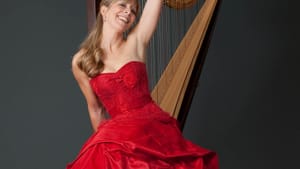Stay in the Loop
BSR publishes on a weekly schedule, with an email newsletter every Wednesday and Thursday morning. There’s no paywall, and subscribing is always free.
New faces, new sounds (and even new words)
Philadelphia Orchestra’s week of premieres

I love theater and music equally, but for different reasons. Theater stimulates my mind; music massages my soul. The spoken word triggers rational thought; music provides inner nourishment. Asking which I enjoy more is like asking which of my children is my favorite.
No matter— both senses were satisfied in this week’s Philadelphia Orchestra concerts.
The composer Tan Dun is known to Americans mostly for his film score for Crouching Tiger, Hidden Dragon, or for his opera, The First Emperor, performed at the Met in 2006. I preferred his more intimate opera, Tea: A Mirror of Soul, when I saw its American premiere at the Santa Fe Opera in 2007.
This weekend he pursued his interest in the culture of his native Hunan province in China, where women speak a thousand-year-old language that’s becoming extinct. Tan Dun undertook the tasks of documentarian, interviewer, cinematographer, librettist and composer for Nu Shu: The Secret Songs of Women, Symphony for Microfilms, Harp, and Orchestra.
Women’s words
To my mind, this work most closely resembles Tea, with its utilization of liquid and percussive sounds.
In its early sections, Nu Shu softly sways while we hear the splashing and dripping of water and the words of women who appear on three large screens. Then Nu Shu expands into powerful statements with loud passages for brass, rising to spectacular crescendi.
Elizabeth Hainen contributed colorful arpeggios and some unusual percussive effects on the harp. Her instrument’s enveloping, stroking (some would say feminine) qualities were appropriate for this piece about women. Meanwhile, Tan’s videos showed the fields of Hunan and three generations of women working there, passing on their exotic language.
It’s rare when you hear concertgoers at intermission humming and whistling tunes from a modern work. It occurred here. Nu Shu should become a staple.
Bassoon intricacies
David Ludwig, a native Philadelphian, wrote a moody piece that showcased the bassoon as a lyrical instrument, rather than portraying the bounce of the grandpa in Peter and the Wolf or the broom in The Sorcerer’s Apprentice. Ludwig’s Pictures From the Floating World is tonal with rare bits of discord, containing atmospheric sections reminiscent of Debussy as well as flashy finger work cadenzas, a catchy slow-slow-quick-quick-quick tune and a dance-like finale. Bassoon soloist Daniel Matsukawa deftly mastered all of the intricacies.
Rachmaninoff dedicated his final composition, the Symphonic Dances of 1941, to the Philadelphia Orchestra. Its international roots provided a link to the new pieces on the program, Rachmaninoff having transplanted himself from Russia to live and work in the U.S.
Scheduling challenge
In contrast to the new works, the Symphonic Dances sounded downright retrograde. Even when it was new— in the troubled early years of World War II— critics accused Rachmaninoff of being old-fashioned. (In fact, at that time audiences found its nostalgic content comforting.) This weekend’s rendition by Yannick Nézet-Séguin was bracing and forthright, building to a brassy loud ending, as did Nu Shu.
Another difference between theater and music is that a play normally runs several weeks, while a concert is heard only two or three times within a single week. This program encountered even more limitations. Behzad Ranjbaran’s concerto for flute received its world premiere Thursday and wasn’t performed Friday, when Ludwig’s concerto for bassoon received its world premiere. Both were performed Saturday night, when Tan’s Nu Shu (a U.S. premiere) was omitted. I wish audiences could get a chance to see and hear all three premieres.
What, When, Where
Philadelphia Orchestra: Tan Dun, Nu Shu: The Secret Songs of Women, Symphony for Microfilms, Harp and Orchestra; Behzad Ranjbaran, Flute Concerto; David Ludwig, Pictures from the Floating World; Rachmaninoff, Symphonic Dances. Elizabeth Hainen, harp; Jeffrey Khaner, flute; Daniel Matsukawa, bassoon; Yannick Nézet-Séguin, conductor. Oct. 31-Nov. 2, 2013 at Verizon Hall, Kimmel Center, Broad and Spruce St. (215) 893-1999 or www.philorch.org.
Sign up for our newsletter
All of the week's new articles, all in one place. Sign up for the free weekly BSR newsletters, and don't miss a conversation.

 Steve Cohen
Steve Cohen